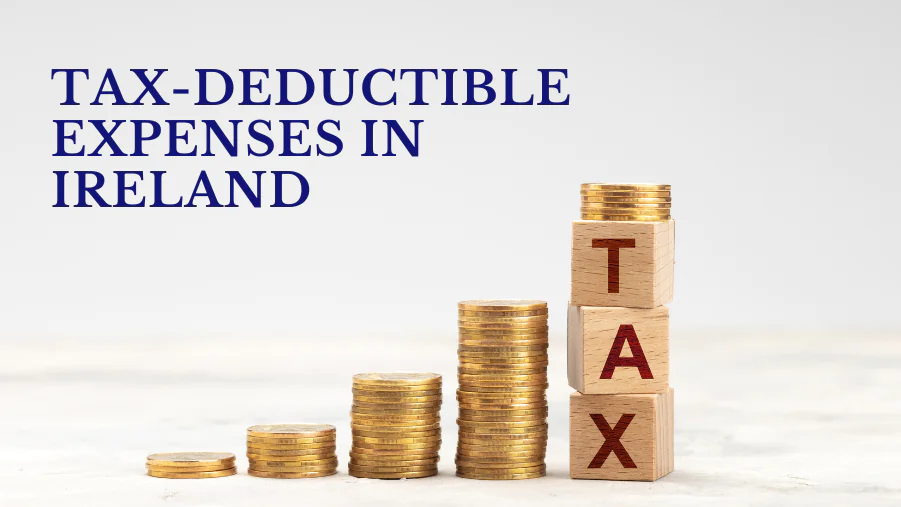Monday, 8 July 2024
Tax-Deductible Expenses in Ireland
Understanding tax-deductible expenses in Ireland is crucial for businesses and self-employed individuals. Accurately tracking these expenses can significantly r...
Understanding tax-deductible expenses in Ireland is crucial for businesses and self-employed individuals. Accurately tracking these expenses can significantly reduce your tax liability, helping you save money and reinvest in your operations. As a trusted provider of taxation services in Ireland, we will explore various tax-deductible expenses. Continue reading for insights into what can be claimed and how to maximise your tax savings.
What Are Tax-Deductible Expenses?
Tax-deductible expenses are costs that businesses and self-employed individuals can subtract from their total income to reduce their taxable profit. These expenses must be directly related to your work or business and not for personal use. Proper documentation and accurate record-keeping are essential to claim these deductions.
Common Tax-Deductible Expenses in Ireland
1. Office Supplies and Equipment
Items such as stationery, computers, printers, and office furniture. These expenses are necessary for day-to-day operations and can be fully deducted.
2. Capital Allowances
While smaller items like stationery can be fully deducted as regular expenses, larger purchases like computers, printers, and office furniture are subject to capital allowances. This means their cost is spread over several years, reflecting the asset's depreciation.
3. Rent and Utilities
Costs related to renting office space, electricity, water, and heating. These are essential for maintaining a workspace and are deductible.
4. Travel and Subsistence
Expenses for business travel can be deducted and include a variety of costs such as fuel, insurance, breakdown and repairs, and vehicle maintenance. Additionally, expenses for other modes of transportation like bus, train, or plane tickets are deductible. Accommodation and meals during business trips are also eligible. Ensure to keep detailed records of the purpose of each trip to substantiate these expenses. Ensure to keep detailed records of the purpose of each trip.
5. Professional Fees
Fees paid for legal, accounting, or consultancy services. These expenses support your business activities and are deductible.
6. Marketing and Advertising
Costs of promoting your business, including online advertising, print media, and promotional materials. These expenses help generate revenue and qualify for tax deductions.

Tax Deductions for Self-Employed
Self-employed individuals can claim specific tax deductions unique to their situation. Understanding these can help manage your tax liability effectively.
1. Home Office Expenses
If you run your business from home, you can claim a portion of your home expenses, such as rent, utilities, and internet. In such circumstances, only a percentage of the running costs can be claimed, based on the proportion of your home used for business purposes. Any non-business parts of your premises cannot be claimed for. This ensures that only the areas and expenses directly related to your business operations are considered deductible.
2. Vehicle Expenses
If you use your vehicle for business, you can deduct expenses such as fuel, insurance, repairs, and maintenance. For professions like taxi drivers, where vehicles are essential to daily operations, these deductions can significantly reduce taxable income. When the vehicle is used for both business and personal purposes, only the business-related portion of these expenses is deductible. It is important to maintain a log of business mileage to ensure accurate calculations for the deductible amount. This helps in claiming only the expenses attributable to business use, complying with tax rules.
3. Wages & Salaries
Businesses can claim tax deductions for various employee-related expenses. This includes wages, salaries, and staff bonuses. Additionally, businesses can deduct the costs of hiring through recruitment agencies and any payments for subcontracted work. It is important to remember that while these expenses are deductible, any payments made to you as a business owner, or personal drawings made from the business for non-business purposes are not eligible for tax relief.
Examples of Tax Deductions You May Not Know About
1. Bad Debts
If you have written off debts because they are no longer recoverable, these can be considered for a tax deduction. For a debt to be deductible, it must have been included in your income at some point. This means if a customer fails to pay, you can claim the amount as a tax-deductible expense. To learn more, visit Revenue.ie.
2. Charitable Donations
Donations made to registered charities can be eligible for a tax deduction. However, to benefit from this deduction, ensure that the charity is officially approved by Revenue. This can reduce your taxable income while supporting a good cause.
3. Interest on Business Loans
The interest payments on loans taken out for business purposes are tax-deductible. It is important to note that only the interest portion of the loan repayment is deductible, not the principal amount. Keeping detailed records of loan interest can help maximise your tax deductions.
Maximising Your Tax Deductions
To make the most of tax-deductible expenses in Ireland, maintain accurate and detailed records of all business-related expenditures. Use accounting software to track expenses and categorise them appropriately. Regularly review your financial statements to ensure you are claiming all eligible deductions.
Effectively managing your tax-deductible expenses can lead to significant savings for your business in Ireland. By understanding what expenses are deductible and maintaining meticulous records, you can optimise your tax situation. At Cronin & Co, we offer expert taxation services to help businesses and self-employed individuals navigate the complexities of tax deductions. Contact us today to learn how we can support your financial success.




